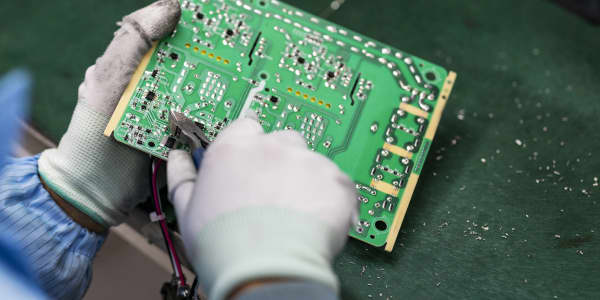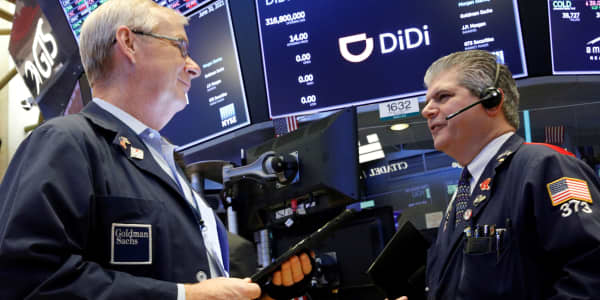Some fans watching WWE wrestlers battle it out in the ring aren't always as interested in the storyline as they are in the lives of the wrestlers.
"Which one is actually a wine connoisseur? Which one dresses the best? Which one has the best entrance music?" said Jay Li, vice president and general manager of WWE's Greater China branch. "We're trying to make that much more of a general interest, and the Chinese audience will respond a lot more to that."
The company is one of many that's experimenting with augmented reality (AR) tech. They're asking questions like: What if you could face your phone at the TV and see an added layer of information or stats?
Such experiences are going to be more and more common as wireless internet speeds get faster, which is why China's already started researching a 6G network, even though its only just launched a 5G one, an official from China's Ministry of Industry and Information Technology told a crowd on Thursday, according to state-sponsored Xinhua News Network.
The 6G network will "change lives" because it'll bring augmented reality experiences to everyday users through wireless download speeds as high as 1 terabyte per second, he reportedly said.
Say 'hello' to holograms
Unlike virtual reality, which usually requires a cumbersome headset, augmented reality could more easily become a daily habit for many, said Rick Garson, founder and CEO of VX Entertainment. Most people won't want to put such a headset on, he added, but holding your phone has become second nature.
"What they're looking for is this really immersive interactive experience," he said at CNBC's East Tech West conference in the Nansha district of Guangzhou, China, this week. "So how do we make the consumer feel like they're part of it?"
Garson said he's now working on apps that would allow fans to essentially beam Olympic athletes into their living room, albeit in hologram form.

"We're only limited by our imagination where we can go with this," he said.
Similarly, executives at ONE Championship, a Singapore-based martial arts fighting series, have started to look at ways to add second-screen experiences that will add a layer to every fight.
"A close up-and-personal experience, be it from the perspective of the athlete or even as a third-party watching a fight, there's a lot you can do, " Group President Hua Fung Teh told CNBC's Arjun Kharpal. "We've actually started to experiment with avatars and gamifying certain parts of our app."
US also eyeing network upgrades
Chinese President Xi Jinping isn't the only world leader pushing for faster networks. President Donald Trump called for the construction of 5G and 6G technology in the U.S. "as soon as possible" in February.
U.S. telecom providers have been busy building such networks, but they're still sparse. Verizon, for example, lists 22 cities where it's added some 5G connectivity, although coverage maps for those cities show only spotty availability. T-Mobile claims a wider range, saying it's set to launch "America's only nationwide" 5G network on December 6.
Huawei Chairman Liang Hua told CNBC this week that his firm has offered to license its 5G technology to U.S. companies, but none have yet reached out.
"I understand that the U.S. government has a lot of concerns," he told CNBC's Geoff Cutmore through a translator this week, "but if a U.S. company got hold of 5G technology, and enabled developments on top of that, it could address the concerns around 5G technology and accelerate the U.S. development of 5G."
Amid the simmering trade negotiations, Trump has said the U.S. government won't do business with Huawei. On Thursday, he instead asked one of the world's most valuable tech companies for help building 5G infrastructure. He wrote on Twitter that he had asked Apple CEO Tim Cook to "get Apple involved in building 5G in the U.S."




